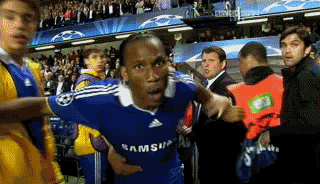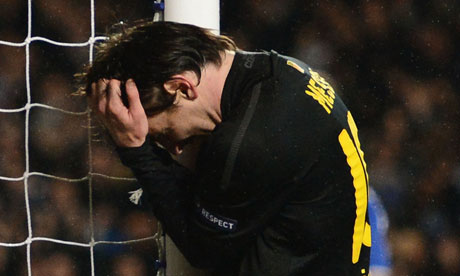When the half-time whistle went, Leo Messi turned and looked to the sky, a pained expression etched across his face. The players headed for the tunnel; Messi bit his lip and silently ambled after them, lost in thought, still mulling over his role in the opening goal perhaps. It was not his normal role.
There was no clever finish here, no dashing run, no assist. Instead he had given the ball away. It was Chelsea's goal, not Barcelona's. There were still 45 minutes to remedy the mistake and Messi certainly tried to do just that but the expression would be much the same at the final whistle too.
Messi had been caught in possession by Frank Lampard. Suddenly space opened up before Chelsea in a way it never would before Barcelona. The swift attack was on. Out it went to Ramires, across to Didier Drogba and Chelsea had the lead. It was the last action of the first half. A moment before Messi had stood stretching uneasily after being left on the floor by Raul Meireles. This, though, hurt more. Roberto Di Matteo had sought counsel over how to approach Barcelona. Play deep, deny space, spring forward quickly – "like motorbikes" in Cesc Fábregas's prophetic words. It had worked.
There had been no home comforts for Barcelona, even though one director described this city as like a second home. London holds a special place in the Catalan collective conscience. It was here that they won their hugely symbolic first European Cup in 1992 – a success that the club's vice-president celebrated by stripping down to his boxer shorts and taking a late-night dip in the freezing, filthy waters of the Thames – and where they won the tournament against Manchester United last year. Then there was 2009, a stage for the Norwegian referee Tom Henning Ovrebo, sure, but stage for Andrés Iniesta too.
And, though it has gone unnoticed in Britain, it was also here in 2006 that the Spanish press said a 19-year-old Messi had graduated against Chelsea: "Messi se doctoró," ran the headlines. Asier del Horno almost sent him to the doctor's. In England Messi was accused of diving. In Spain his display was considered confirmation of an emerging and very special talent.
Messi became the best. And yet he had not scored against Chelsea even though, as Frank Lampard put it, every time you put on the telly he scores two as standard. In fact Chelsea were unbeaten against Spanish opponents in 13 games, going back to that 2-1 Barça win here in 2006. Messi had scored 243 goals for Barça, none in six games against Chelsea. That is seven now. Barcelona may have had 72% of the ball but Chelsea were rewarded for their organisation and commitment.
Space denied, in the first half Messi was often found dropping deep and occasionally flickered into life as Barça built their attacks and Chelsea lay in wait. He had a shot charged down just after the quarter hour, immediately reaching the loose ball to find Iniesta, who drew a save from Petr Cech.
He leapt high to force Cech into another save from his header 10 minutes later and there was a real Messi moment two minutes before half-time, when he robbed Mikel John Obi and dashed through, the ball not so much tied to his foot as seeming to follow him faithfully. He slipped it through to Fábregas. The shot was dinked over the keeper but cleared off the line. A moment later Messi scuffed a shot wide. "Who are ya?" chanted Chelsea's fans. Soon they had an answer they never expected: the man who helped them take the lead.
Messi disappeared down the tunnel chewing on that moment. He reappeared determined to put it right. There was more dynamism now, more intent, more directness. What there was not was a way through. A shot in the opening minute, blocked, and one of those hold-your-breath moments as he surged away from one challenge and took aim. Gary Cahill, though, came flying across to block. It was not the first time and it would not be the last: as Chelsea constructed a barrier on the edge of their box, Cahill was often the quickest out. John Terry, too, dived in to block him. His reward: Messi's shirt.
Messi did not desist. He drew free-kicks on the edge of the box – the first from Mikel's hand, the second from Ramires' foul. He was then felled further out as he tried to weave through. The opportunities came to nought: Messi and Daniel Alves hit the wall, Xavi floated over. Another free-kick came, won by Messi once more. This time he clipped it in for Carles Puyol's header. Cech saved.
There was even time for him to find Pedro in the last minute, only for the ball to come back off the post and Sergio Busquets to put the rebound over the bar.
This was a strange night at Stamford Bridge for Messi, departing at full-time wearing an expression much like the one he wore at half-time. Look at the list of this game's key moments: with the exception of Alexis Sánchez's shot off the bar Messi was at the heart of all of them. Unfortunately for Barça, that included the only goal of this game, Chelsea's goal.






